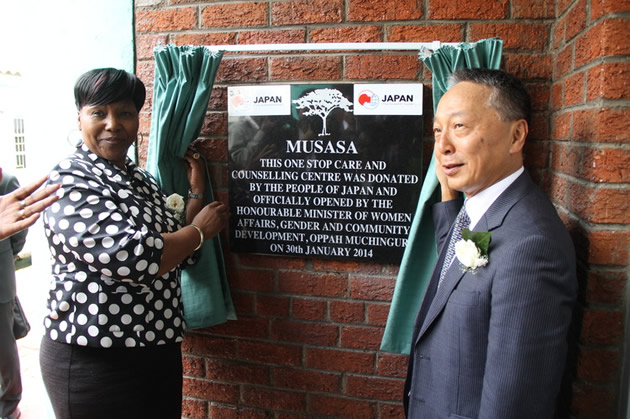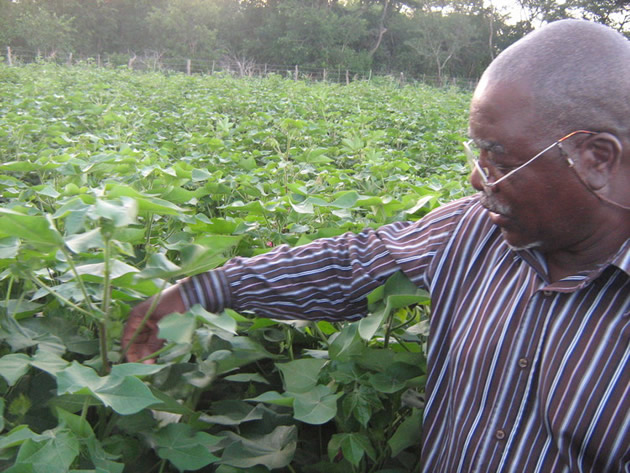Abused women now have a home


Minister Oppah Muchinguri and Japanese Ambassador to Zimbabwe Yohezo Tukuda unveil the one-stop care and counselling centre in Harare recently
Tafadzwa Ndlovu Features Writer
Women who are victims of domestic violence and abuse often find themselves without a home, physically and emotionally, while they pay the heavy price of being the less powerful of human species.
Violated and vanquished, most of them often do not have anywhere to run to and they have no choice but to go back to abusive situations. According to statistics, violence against women and girls is so prevalent in Zimbabwe that it affects at least one in three women during their lifetime.
In many cases, women experiencing violence become separated from their communities and families and have limited support to enable them to leave the violent situations and seek justice.
The establishment in January of a one-stop care and counselling for women in Harare was a major milestone in the history of the country in efforts to fight against gender based violence.
The centre, which was officially opened by Musasa Project, aims at empowering women who would have succumbed to GBV. The new facility is the first call centre for abused women in the country and is composed of counselling rooms, waiting space, training room and other basic facilities.
The care centre offers psychological, legal, medical, reproductive rights services, training and mentorship support all under one roof. This move is a direct response to one of the major objectives within the national GBV strategy under service provision. The project, which was started in 2010, was built in partnership with the Embassy of Japan which contributed over US$120 000 for the initial set up.
Msasa Project director Ms Netty Musanhu explained how the one-stop centre would work and its benefits for women.
“We are glad to have launched this massive project which is going to assist girls of all age groups and women who would have suffered abuse, violence and rape,” she said.
“The project would like to see women survivors in need of immediate physical and mental protection provided with a safe home and with information to build their confidence and skills so as to increase their capacity to regain control of their lives free from violence.
“This one-stop care centre is unique in the sense that all that a woman requires after being tortured or abused can be found in one place. There would be counsellors waiting to give psychological support to survivors for confidentiality purposes. We provide access to medical treatment for women survivors and their children in need of treatment including maternity care.
“We also provide temporary shelter to vulnerable women and they are able to acquire legal services here. In the past if we had cases of abuse or rape, we would then refer our clients to legal practitioners but we can now do it here with the help of volunteers from the Zimbabwe Women Lawyers Association,” she said.
Ms Musanhu said the care centre received around 60 women a day and most of them are pregnant young girls who in most cases are victims of rape. Musasa Project provides medical and reproductive health education on how to handle themselves in their different situations. Tag A Life International director Ms Nyaradzo Mashayamombe says the opening of the centre was a master-stroke.
“Setting up of this care centre is commendable and more than welcome by us. This kind of model should be rolled out to the rest of the country; at least each province should have one of these.
“We have realised that more girls that are being raped are orphans and most of them are scared to report such issues to the police because of the process they have to go through. But with a shelter like this, they have somewhere to go and are kept safe,” said Ms Mashayamombe.
Musasa’s safe house is furnished with beds, kitchen equipment and a garden and the facilities and services will benefit at least 100 women and 140 children every year. The shelter has 25 beds serving 25 survivors at a time with the assumption that a woman stays in the safe house for up to three months. More countries in Southern Africa are also establishing one stop care and counselling centres. Zambia has established more than five one stop care and counselling centres, Malawi has three centres and South Africa has more than 27 centres which are fully operational which they call Thuthuzela (comfort) call centres.
Experts say that one-stop care and counselling centres have their benefits and downside. Besides having all you need at one place, the process is not time consuming. They say that evidence cannot be lost during the process and victims are able to be accommodated at that same place. Rape or abuse is not something that someone enjoys talking about and one can just say it once to a counsellor without being frustrated. On the downside they also say it has limited resources as it can only accommodate few women. For this one in particular it is based in Harare but some women in rural areas cannot access it.
There are transport costs involved and if one is not in Harare that becomes a problem. Most of these women being abused are not financially stable and they would not afford to travel to Harare for services.
They say there is a need for greater linkages with the health sector to provide survivors with immediate access to post-exposure prophylaxis by locating GBV services or one-stop centres within hospitals and Government health facilities.
Without family support in these years of economic hardship and the break down of family ties, the one stop care and counselling centres promise a lot of hope.








Comments